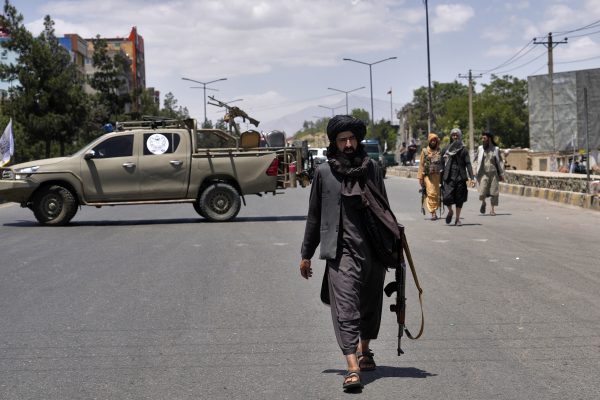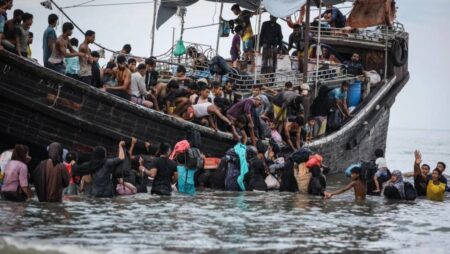MANTRAYA ANALYSIS#64: 10 MARCH 2023
Taliban Incapacity and the growing threat of Islamic State-Khorasan Province
SHANTHIE MARIET DSOUZA & BIBHU PRASAD ROUTRAY
ABSTRACT
In the past two years, the Islamic State’s Khorasan Province in Afghanistan has increased its cadre strength from 3000 to 6000. Taking advantage of the ungoverned spaces and the Taliban’s inability to contain its growth, the group continues to gain strength. The Taliban rely on raids and killings of odd IS-KP cadres, but this hasn’t done much to dent the terror group’s expansion into almost all provinces of Afghanistan. Taliban’s incapacity and denial of the emerging threat are serious problems, not just for Afghanistan’s peace and stability, but for the entire region. What are the reasons behind the expansion of IS-KP in Afghanistan? Does the ungoverned space in Afghanistan provide it with the opportunity to expand its presence? What are the implications of the growth of IS-KP for the region and world at large? This article attempts to address these crucial questions.
Introduction
In early February 2023, a report by the United Nations said that the Islamic State’s Khorasan Province (IS-KP) has threatened to target Chinese, Indian, and Iranian embassies in Afghanistan. On 2 February, Saudi Arabia closed its embassy in Kabul and evacuated its staff to Islamabad following threats by the group. Turkish and Qatari embassies were placed on high alert. A few days later, in the 18th issue of its monthly ‘Khorasan Ghag’ magazine, the IS-KP termed Pakistan a “cancer” for Islamic existence and is run at the behest of the United States. Days after, it threatened to launch attacks against the Pakistan embassy in the Afghanistan capital. After attacks carried out by the ISKP on Russian and Pakistani embassies in September and December 2022 respectively, the potency of the group has never been in doubt. At the same time, the Islamic Emirate of the Taliban’s ability to provide full-proof security elicits little confidence.
Taliban under Pressure
The Taliban is under pressure to neutralise the growing threat of the IS-KP for two reasons. First, the group’s growth constitutes a direct challenge to the Islamic Emirate and its claim of control over Afghanistan. Secondly, the Taliban want to demonstrate its commitment to now allow Afghan soil to be used by any global terror group. However, while it has been largely viewed as ‘sincere’ in its attempts, its capacity to do so remains suspect. For instance, the U.S. state department’s Country Report on Terrorism 2021 mentions, “Although the Taliban committed to preventing terrorist groups from using Afghanistan to stage attacks against the United States or others, the extent of its ability and willingness to prevent AQ [al-Qaida] and ISIS-K from mounting external operations remained unclear.” Periodic violence by the IS-KP underlines that the group remains strong and a potent adversary to the Taliban.
Raiding the alleged IS-KP hideouts and safe houses and killing its cadres has remained the primary modus operandi of the Taliban vis-à-vis the terror group. The Islamic Emirate highlights every incident of this nature as its success. On 28 February, Taliban spokesperson Zabihullah Mujahid announced the killing of IS-KP intelligence chief Qari Fateh during an overnight raid in Kabul. Mujahid described him as the main tactician for the group and responsible for planning several attacks, including those against Russian, Pakistani, and Chinese diplomatic missions in Kabul.
Mujahid also confirmed the killing of Ejaz Ahmad Ahangar, the ‘first Emir’ of Islamic State Hind affiliates on 14 February. Ahangar, an Indian national who was designated as a terrorist by the Indian government in January 2023, was allegedly the mastermind of the suicide bombing in March 2020 which claimed the life of a security guard and 24 worshippers at the Gurdwara Kart-e Parwan in Kabul. Prior to that, a raid in Kabul led to the killing of three IS-KP cadres and the arrest of another.
However, the authenticity of some of these claims has been contested by the IS-KP. The group alleges that ‘raids’ carried out by the Taliban are fake, and merely involve the killing of captive IS-KP prisoners in staged encounters. For instance, in response to the Taliban’s announcement, through its Bakhtar news agency that it has eliminated six IS-KP cadres in Herat city on 4 March 2023, the IS-KP’s weekly magazine claimed that the Taliban have faked an attack scene and killed three IS-KP prisoners along with their family members. It warned the Taliban of revenge.
ISKP’s Expansion
The IS-KP describes the Taliban as ‘apostates’ and mocks its members as puppets of the Americans. In the past years, the same strategy was employed by the Taliban to deride the civilian government. Such criticism of the Taliban by the IS-KP is clearly directed at establishing itself as an uncompromising puritan group, pursuing an undiluted ideology. This may have held out some amount of appeal to a large number of elements within the Taliban and other terror groups, who find their parent organisations unsuitable to pursue violent jihad. Some former elements of the deposed civilian regime too may have joined the IS-KP to protect themselves from Taliban persecution.
The IS-KP’s cadre strength was roughly assessed to be anywhere between 2000 to 3000, by U.S. State Department’s Country Report on Terrorism, 2021. However, the February 2023 report of the United Nations cites a much higher figure of 6000, indicating thereby that the group may have been successful in recruitment. The UN report clearly refers to the ISK-KP strongholds in Afghanistan’s eastern Kunar, Nangahar, and Nuristan provinces, all of which border neighbouring Pakistan.
The group’s influence is linked to Afghanistan’s conducive environment, especially after the August 2021 forcible assumption of power by the Taliban. Thousands of imprisoned IS-KP fighters, such as Ahangar, escaped during the Taliban takeover, nullifying years of efforts put in by the dismantled Afghan intelligence agency, the National Directorate of Security (NDS), whose operations were, nevertheless, marked by large-scale human rights abuses.
These escapees have seemingly contributed to the IS-KP’s growing potential, which is difficult to check with arrests and killings of odd cadres and senior leaders. Ahangar had been arrested in Kandahar in 2000 along with Aslam Farooqi, the Pakistani head of IS-KP. While Ahangar has been killed, Farooqi reportedly runs a military base cum training facility in Nangarhar province bordering Pakistan. In January 2022, Pakistani media reported the killing of Farooqi in northern Afghanistan. However, according to a UNSC report in February 2022, he remains active and well. Being a Pakistani national, hailing from Khyber-Pakhtunkhwa’s Orakzai district, Farooqi’s recruitment campaign focuses on India and Pakistan.
No Credible anti-dote
The IS-KP’s expansion in Afghanistan clearly needs an anti-dote and at the moment, barring the Taliban, none exists. The NDS, raised and trained by the Central Intelligence Agency (CIA), was relatively more successful vis-à-vis the group. The Taliban, on the other hand, have found transforming themselves from a terror group to a governing entity, with a capacity to pursue effective counter-terror policies, extremely challenging. The IS-KP appears to have benefited from this pervading incapacity and will do so in the coming months. The killings of some of its senior leaders may at best temporarily slow down its expansion.
Worse still, the Taliban regime remains opposed to any operational collaboration with foreign countries in its anti-IS-KP campaign, while evincing fleeting interest in getting its policemen and soldiers trained by countries like India. The Islamic Emirate repeatedly insists that the IS-KP’s influence in Afghanistan is negligible and it is capable of dealing with the threat on its own. It, however, remains somewhat open to discuss the issue with other countries. Media reports have indicated that Indian intelligence officials in consultations with their Taliban counterparts in late 2022 may have highlighted the case of Ejaz Ahmad Ahangar’s presence in Afghanistan and may even have provided critical inputs regarding his location, leading to his killing. In February 2022, a Pakistani Ministry of Foreign Affairs (MoFA) Office delegation led by Defence Minister Khawaja Asif met Afghan Deputy Prime Minister Mullah Abdul Ghani Baradar Akhund, Defence Minister Mawlavi Mohammad Yaqoob Mujahid, Interior Minister Sirajuddin Haqqani and Foreign Minister Amir Khan Muttaqi. A MoFA press release said that the threat posed by the IS-KP and the Tehreek-i-Taliban Pakistan (TTP) featured in their consultations. In October 2022, Tom Niklasson, European Union’s special representative for Afghanistan, held consultations with the Taliban on a wide range of issues including the IS-KP’s threat.
However, there is no indication that these consultations have translated into the possibility of the Taliban accepting any external assistance to deal with the IS-KP. Taliban continue to remain in denial mode, giving the impression that dealing with the IS-KP isn’t exactly a priority issue for it. This further indicates if the old connections between the IS-KP and the Haqqani Network still remain intact, thereby constraining the Islamic Emirate to indulge in showpiece raids and questionable claims regarding weakening the group.
Way Forward
In the first week of March, the IS-KP’s propaganda mouthpiece, Voice of Khorasan, claimed responsibility for a car explosion in front of Sangameswarar temple in Coimbatore on 23 October 2022, and possibly the pressure cooker blast in an auto rickshaw in Mangaluru on 19 November 2022. The authenticity of the claims notwithstanding, the IS-KP remains focused on the entire South Asia region, particularly in India, where its repeated attempts to carry out attacks and incite Muslims have failed. One of the primary reasons for such failure is the absence of a liberated territory in South Asia, which can be used as a firm launching pad for carrying out attacks. Post-August 2021, Afghanistan is on its way to affording such a facility to the IS-KP. It is for this reason that the Taliban’s incapacity and denial of the IS-KP’s threat are dangerous for the region’s security. In the absence of the Taliban’s lack of interest in receiving external assistance, regional cooperation remains the only way out to deal with this threat. However, even here, the lack of unity and a common outlook have emerged as bottlenecks. Moreover, the Taliban’s regressive policies at home continue to make full-fledged cooperation with it an untenable scenario. Clearly, at the moment, countries like India appear to have no option other than focusing primarily on strengthening their counter-terrorism capacities, even as the IS-KP grows from strength to strength in Afghanistan.
(Dr. Shanthie Mariet D’Souza is Founder & President, Mantraya. Dr. Bibhu Prasad Routray is the Director of Mantraya. This analysis has been published as part of Mantraya’s ongoing “Islamic State in South Asia”, “Mapping Terror & Insurgent Networks”, and “Fragility, Conflict, and Peace Building” projects. All Mantraya publications are peer-reviewed.)
To read previous Mantraya Analyses CLICK HERE



